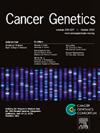Prognosis prediction and drug guidance of ovarian serous cystadenocarcinoma through mitochondria gene-based model
IF 2.1
4区 医学
Q4 GENETICS & HEREDITY
引用次数: 0
Abstract
Background
Mitochondrial dysregulation contributes to the chemoresistance of multiple cancer types. Yet, the functions of mitochondrial dysregulation in Ovarian serous cystadenocarcinoma (OSC) remain largely unknown.
Aim
We sought to investigate the function of mitochondrial dysregulation in OSC from the bioinformatics perspective. We aimed to establish a model for prognosis prediction and chemosensitivity evaluation of the OSC patients by targeting mitochondrial dysregulation.
Methods
Differentially expressed genes (DEGs) were screened from the Cancer Genome Atlas (TCGA)-OV dataset and the mitochondrial-related DEGs were identified from the Human MitoCarta 3.0 database. Prognosis-related mitochondria-related genes (MRGs) were screened to establish the MRGs-based risk score model for prognosis prediction. To validate the risk score model, the risk score model was then evaluated by IHC staining intensity and survival curves from clinical specimens of OSC patients. Migration and proliferation assays were performed to elucidate the role of carcinogenic gene ACSS3 in serous ovarian cancer cell lines.
Results
Using consensus clustering algorithm, we identified 341 MRGs and two subtypes of OSC patients. Moreover, we established a novel prognostic risk score model by combining the transcription level, intensity and extent scores of MRGs for prognosis prediction purpose. The model was established using 7 MRGs (ACOT13, ACSS3, COA6, HINT2, MRPL14, NDUFC2, and NDUFV2) significantly correlated to the prognosis of OSC. Importantly, by performing the drug sensitivity analysis, we found that the OSC patients in the low-risk group were more sensitive to cisplatin, paclitaxel and docetaxel than those in the high-risk group, while the latter ones were more sensitive to VEGFR inhibitor Axitinib and BRAF inhibitors Vemurafenib and SB590885. In addition, patients in the low-risk group were predicted to have better response in anti-PD-1 immunotherapy than those in the high-risk group. The risk score model was then validated by survival curves of high-risk and low-risk groups determined by IHC staining scores of OSC clinical samples. The carcinogenic effect of ACSS3 in OSC was confirmed through the knockdown of ACSS3 in SKOV3 and HO-8910 cells.
Conclusion
To summarize, we established a novel 7 MRGs - based risk score model that could be utilized for prognosis prediction and chemosensitivity assessment in OSC patients.

基于线粒体基因模型的卵巢浆液性囊腺癌预后预测及药物指导。
背景:线粒体失调与多种癌症类型的化疗耐药有关。然而,线粒体失调在卵巢浆液性囊腺癌(OSC)中的功能仍然很大程度上未知。目的:从生物信息学角度探讨线粒体失调在OSC中的作用。我们旨在建立一个以线粒体失调为目标的OSC患者预后预测和化疗敏感性评估模型。方法:从Cancer Genome Atlas (TCGA)-OV数据集中筛选差异表达基因(differential expression genes, deg),从Human MitoCarta 3.0数据库中鉴定线粒体相关deg。筛选预后相关线粒体相关基因(MRGs),建立基于MRGs的预后预测风险评分模型。为了验证风险评分模型,通过OSC患者临床标本的免疫组化染色强度和生存曲线对风险评分模型进行评估。我们通过迁移和增殖实验来阐明致癌基因ACSS3在浆液性卵巢癌细胞系中的作用。结果:采用一致聚类算法,我们确定了341个mrg和两个OSC患者亚型。此外,我们结合MRGs的转录水平、强度和程度评分,建立了一种新的预后风险评分模型,用于预后预测。采用与OSC预后显著相关的7个MRGs (ACOT13、ACSS3、COA6、HINT2、MRPL14、NDUFC2、NDUFV2)建立模型。重要的是,通过药物敏感性分析,我们发现低危组OSC患者对顺铂、紫杉醇、多西他赛的敏感性高于高危组,而高危组OSC患者对VEGFR抑制剂阿西替尼、BRAF抑制剂Vemurafenib、SB590885的敏感性高于高危组。此外,预测低危组患者抗pd -1免疫治疗的反应优于高危组。然后通过OSC临床标本IHC染色评分确定高危组和低危组的生存曲线验证风险评分模型。通过在SKOV3和HO-8910细胞中敲低ACSS3,证实了ACSS3在OSC中的致癌作用。结论:综上所述,我们建立了一种新的基于7个MRGs的风险评分模型,可用于OSC患者的预后预测和化疗敏感性评估。
本文章由计算机程序翻译,如有差异,请以英文原文为准。
求助全文
约1分钟内获得全文
求助全文
来源期刊

Cancer Genetics
ONCOLOGY-GENETICS & HEREDITY
CiteScore
3.20
自引率
5.30%
发文量
167
审稿时长
27 days
期刊介绍:
The aim of Cancer Genetics is to publish high quality scientific papers on the cellular, genetic and molecular aspects of cancer, including cancer predisposition and clinical diagnostic applications. Specific areas of interest include descriptions of new chromosomal, molecular or epigenetic alterations in benign and malignant diseases; novel laboratory approaches for identification and characterization of chromosomal rearrangements or genomic alterations in cancer cells; correlation of genetic changes with pathology and clinical presentation; and the molecular genetics of cancer predisposition. To reach a basic science and clinical multidisciplinary audience, we welcome original full-length articles, reviews, meeting summaries, brief reports, and letters to the editor.
 求助内容:
求助内容: 应助结果提醒方式:
应助结果提醒方式:


